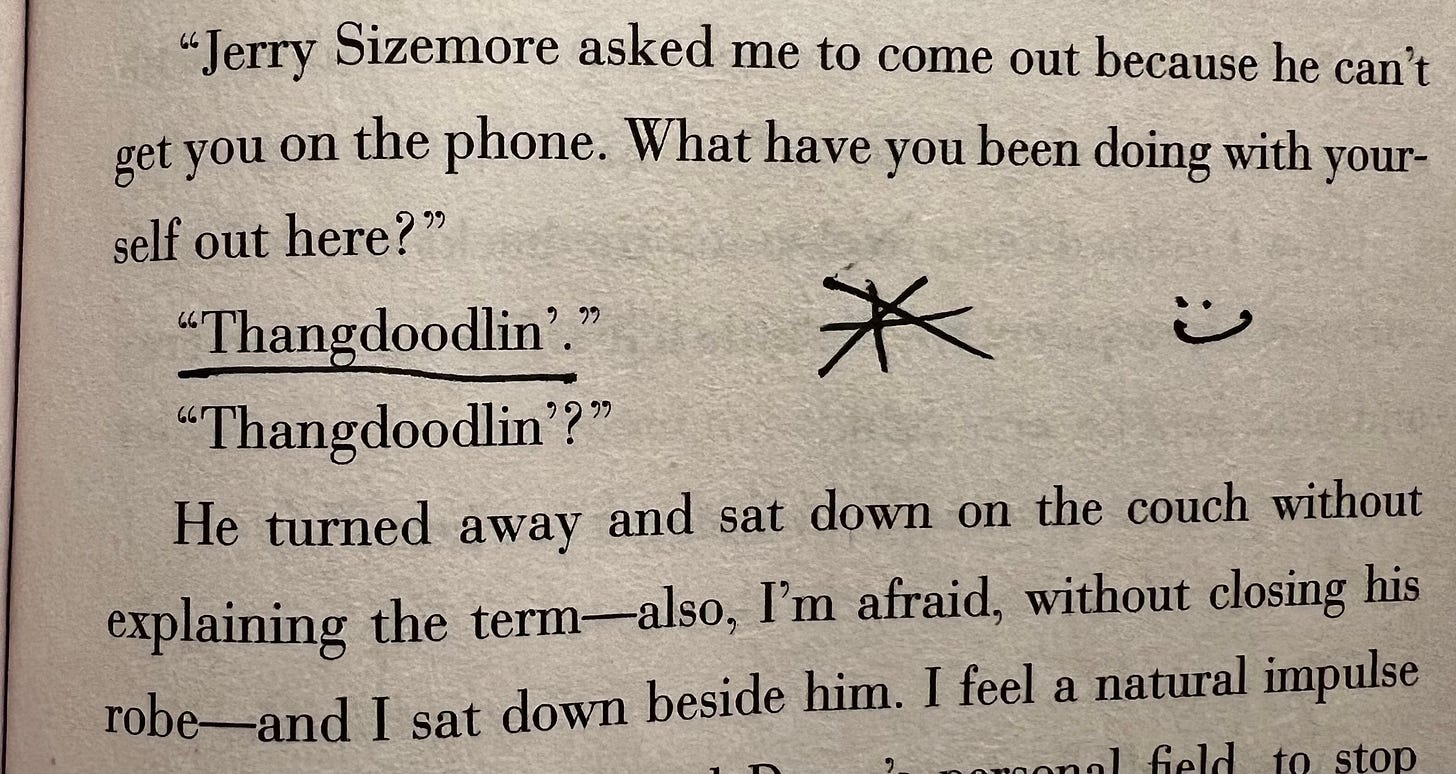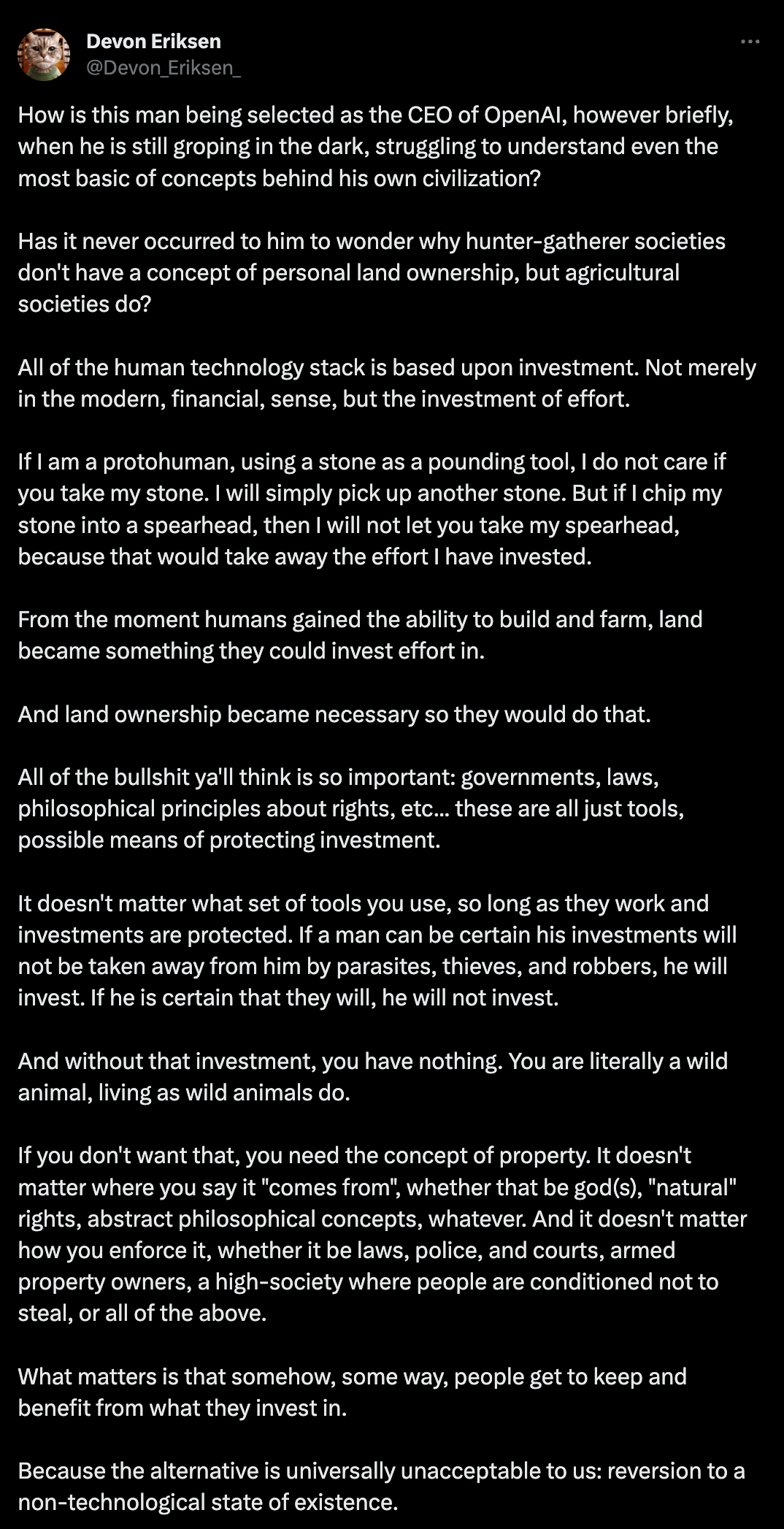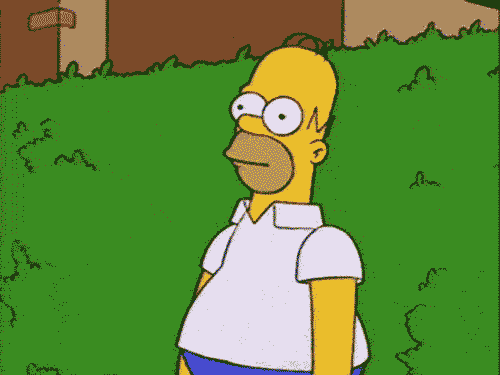Hello, sailors. Good tidings, etc.
For the first time in a long time, and maybe the last time, I am home. Upstairs, in the attic. As I write this, my dad is on the far side of the room, typing up the Great American Novel on the loudest keyboard in existence. Meanwhile I’m sitting criss-cross applesauce next to the ping-pong table, my dad’s college tennis trophies, and the few paintings which survived my brother’s art phase in high school.
It’s a weird feeling, being back.
The last time I was here in Oxford, Mississippi, I was wiping the groceries down with bleach, slinging bonds from our back porch, and biking long loops around the neighborhood until the cabin fever left my body.
Fast forward: My dad’s retiring, and my parents are going to sell the house. Outside the window, I can see the towering magnolia tree we planted in the middle of the lawn when I was seven years old. A gift from my aunt and uncle, it wasn’t five feet tall when we dug it into the ground some twenty years ago.
For so long, I came back to this place again and again feeling as if nothing had changed. A part of me stopped wanting to come back at all. There were other places I wanted to see and new experiences I needed to have. I realize only now that, in my absence here, a generation has come and gone.
I was not prepared for it. The kids I went to school with aren’t just married; they have kids themselves, and several of them. Dinner with my parents is an exchange of names. My first swim coach, Mr. Uhl, who used to pass me Barron’s clippings on the pool deck, now day-trades micro caps from his backwater manor deep in the delta. My old violin teacher, Mr. Bell, who relished nothing more than a story well-told—often, the same story, told time and again—still insists on chopping his own firewood. Both of them are now north of ninety years old.
Time, or our perception of it, isn’t evenly distributed. There are decades where nothing happens, as they say, and there are weeks where decades happen. When you step out of the fog.
I remember seeing the darnedest things on those pandemic bike rides. Out there—among the many farms, churches, and cemeteries which still christen the desolate tracks of Highway 6, 7, 314—you’ll find a thousand fading memories. No cap: A herd of sheep in a dandelion field, a woman standing over a tombstone in the pouring rain, a stray cat sitting sphinx-pose in the middle of the road and looking at you with its yellow eyes, utterly free of dread.
How does one even begin to describe what it’s like, listening to Icona Pop’s “I Love It” and cruising through Faulkner’s Yoknapatawpha County a century after it fell off the face of the earth?
I got this feeling on the summer day when you were gone
A toe-tapper if I ever heard one. It could almost be the soundtrack to a certain film…
Back to where it all began!
In my first piece here, we talked about the greatest movie that ever was. Well, you can’t outrun your dreams, I always say—and certainly not the ones others have done the business of dreaming for you.
Dare we risk another intimate stroll through Lee Chang-dong’s glittering hall of mirrors? To dip but a toe once more into the DMZ between reality and fiction, daddy issues and nest-eggs, self-expression and self-delusion… Beloved, do not fall apart in my hands.
Our fearless, foolish hero is Jeong-su, couch potato and writer-in-waiting. Our villain, awakened from the Limbro of our protagonist’s psychosis, is f-boy Ben. Who among these problematic men will win the wounded heart of elusive crush Hae-mi? Where in the world is Carmen Sandiego?
The starving artist, the unfeeling capitalist golem, an old flame from middle school cutting up the dance floor in the balance… Ah, a love triangle as old as time. But also distinctly… millennial? These archetypes, familiar as they are to someone like me, do not belong to the current era of history. Their aspirations are so offline, non-ideological, and non-ironic as to seem quaint. I’m looking at you, snapback dude at the gym, holding Leaves of Grass in one hand and thumbing through Kilter Board routes on the other.
Books, weed, meet-cutes… Did these things survive the 2010s? Is it just me, comin’ up on thirty and thangdoodlin’1 in the hometown I never come back to… or do these things now live, primarily, on the ever-receding shore of nostalgia?
Ben, we learn, burns greenhouses for fun. The reveal is the biggest moment of the film; something clicks into place for us. If before he was little more than a crypto-bro cipher, all moneyed disinterest and sangfroid, now he presents as the man we expect men like him to be: a force on the margins of society. Whereas Jeong-su struggles to fill the blank page of his life, Ben—with each strike of the match—snuffs out the remnants of others. And for what?
It is left entirely to our interpretation whether Ben’s terrorist alter-ego is real or imagined, whether his targets are in fact abandoned greenhouses, or the many young, sensitive women who flit in and out of his company. Forests burn, women disappear, and yet the hand of the artist has become imperceptible. As in Bolaño’s 2666, the mystery of the crimes is also the secret of the missing author: Who is the artist of the people’s suffering? Alongside Jeong-su, we develop a mirage-like image of the perpetrator, the mirror of our doubts, delusions, and phobias—our own history of violence.
And so Ben swans onto the scene: the unsub incarnate.
“If everyone hates the current system, who perpetuates it? And Ginsberg answers: ‘Moloch.’ It’s powerful not because it’s correct – nobody literally thinks an ancient Carthaginian demon causes everything – but because thinking of the system as an agent throws into relief the degree to which the system isn’t an agent.”
(“Meditations on Moloch,” Slate Star Codex)
What I want to spend time on here, if you can find it in your heart to indulge me, is the explicit connection of Ben’s killings with the destruction of the natural world.
It’s a cunning metaphor, for the simple reason that I’m not sure it is one. If Ben’s greenhouses were really just stand-ins for his women victims, why would he provide Jeong-su with such a half-baked cover story?
No: Ben reveals his secret to Jeong-su in order to implicate him in the crimes.
“The morality of nature,” Ben tells him, “is like simultaneous existence… I'm here, and I'm there. I'm in Paju, and I'm in Banpo. I'm in Seoul, and I'm in Africa. Something like that.”
In other words, these are not isolated acts of evil. We are bearing witness to a collective evil perpetrated upon collective victims in a morally bankrupt society. Jeong-su is no mere bystander, and Ben is far more evil than a modern-day Gatsby.
This is most clear in the source material, Murakami’s story “Barn Burning,” in which the narrator goes to painstaking lengths mapping out the barns (greenhouses) in his area that might be targeted next, and even considers burning one down himself. In the first scene, where he meets the original Hae-mi, the narrator draws a bewildering parallel between himself and Adolf Eichmann, the traveling salesman who would become one of the chief architects of the Holocaust. At his trial in Jerusalem, Eichmann infamously denied all charges of antisemitism and claimed to have only been “following orders.” How could such a seemingly ordinary person be capable of such atrocities?
In Burning, the ‘crime’ lies in the eye of the beholder. In perceiving the greenhouses to be women, Jeong-su actually projects his own conscience. Consider Hae-mi’s recollection of his casual cruelty to her in school, how he insulted her appearance, only to accept it now, after plastic surgery. At his father’s farm, in their last conversation before she disappears, Jeong-su calls Hae-mi a whore for undressing in front of other men.
Immediately after this, the movie pivots towards our hero’s unhealthy obsession with ladykiller Ben. Doth the lady protest too much? Jeong-su’s detective work is, after all, curiously self-directed. We are always prosecuting our own crimes.
By the end of the movie, the greenhouses have been all but forgotten, erased by Jeong-su’s enactment of revenge against Himself. The narcissism here is chilling. Even in our transgressions, we imagine ourselves to be special; we perceive our failures to be ours alone, and the consequences of those failures to be local. We do not view our identities and actions as the emanations of larger systems of norms and incentives. To do so would be to recognize a kind of collective consciousness at work, a hive-mind not unlike the neural network of mycelium (“nature’s internet”) which can transform 50 thousand aspen trees into a single organism.
Trapped in the amber of his own naughtiness, Jeong-su ultimately forgets what Ben first revealed to him: the original sin. To burn greenhouses is to poison the public brain.
At the end of the day, this isn’t about me, or you, or Jeong-su, or his abusive father. This is about Moloch—the ghost in the machine, the one giving the orders. All around us, one flaming hole in the ozone layer at a time, the world is growing warmer.
What does one do at the family farm but confront their inheritance?

“The world was outside us. It was something we were in. But seeing it, it became a part of us. So wasn’t the world then inside us? If it was only on the outside and nothing of it got in, everything would just be dark… Our senses took what was external and turned it into something internal. If the world couldn’t get inside us, it wouldn’t exist…
Was that what life was? Was that what set it apart from what was not living? What was living was living because it internalised the world?”
(Karl Ove Knausgård, The Wolves of Eternity)
The year is 1986. Shortly after the Chernobyl disaster, 20-year-old Syvert Løyning returns home from a short stint as a military cook to seek his fortune. His dad (also Syvert) died young, and it’s just his mother and younger brother at the house. Needless to say, although he may be a king in the kitchen, Syvert’s not exactly a provider. He is woefully ignorant of the role that awaits him. What will he do with his life? How will he help his ailing mother and antisocial young bro? Might we simply… let the man cook?
Fate says no. If Burning taught us anything, it’s that back on the family farm the sins of the father loom large. Syvert discovers a box of letters in Russian in the un-burned barn out back. Turns out Syvert Senior was living a second life with another woman in the Soviet Union. Is she still alive? TBD. Meanwhile, Syvert takes a job as an undertaker…
Welcome to Karl Ove Knausgård’s latest novel, The Wolves of Eternity.
Yes, yes, baller title. When you give your book a name like that, playtime’s over. You’re gonna slay the dragon, or die trying. And in the interest of keeping it real with you, 800 pages later I’m still not sure if the dragon’s dead or just low HP. As ever, the reader must deliver the coup de grace. My plane touched down at Memphis International Airport just as Syvert and his long-lost sister Alya reunite in the present day. Vibe!
About halfway through, the book zooms out and takes a hard left turn. We are asked to step back from the characters themselves and consider their story through a lower-fidelity lens. They are no longer isolated personalities but a genealogy, a family tree whose branches we follow back into a history we cannot experience for ourselves. In effect, Knausgård presents us with “another experience of the world,” a contrary one, in which the stories of our lives have been stripped of man-made distinctions (identity, politics, culture, etc.) and reunited in the language of something deeper: the natural world.
If Burning immerses us in Jeong-su’s head to the extent that we lose touch with objective reality, The Wolves of Eternity gives us the whole shebang at scale. It’s Dostoevsky versus Tolstoy, in a way, if War & Peace dropped the philosophy shtick and went full Gödel, Escher, Bach. The point being, it’s easy to forget Dostoevsky and Tolstoy were writing in the same time, about the same place. The same applies to Lee and Knausgård: Both of these inheritance sagas contrast a free and open culture with its authoritarian neighbor. And both of them explore the concept of inheritance by urging us to understand the world that surrounds us—nature—as a sentient being, as the cleanest example of a collective consciousness available to us in our culture.
There are no heroes here, and no villains. It’s nothing but side-quests. Strip everything down, and you have a single story: a man and a woman who think they know each other but don’t, closing their eyes and seeing the same dream.
Reality is a zero-player game. The only enemy is Death.
I had an inheritance from my father, it was the moon and the sun.
And though I roam all over the world, the spending of it’s never done.
(Ernest Hemingway)
This morning, while lying wide-awake in bed at 4 a.m., I scrolled onto a Twitter landmine. In the embedded thread, a science fiction novelist with a cat for his profile picture goes off, full regalia, on OpenAI usurper Emmett Shear after he endorses a blanket 50 percent “death tax” on inheritance money, the proceeds from which would be redistributed among all children.
Shear’s heart, if he has one, seems to be in the right place. After all, we have an inequality problem in this country, the bulk of which seems to revolve around the hoarding of dynastic wealth. Most people don’t know this, but when you buy the farm (i.e. die), you do not give up the farm. Whatever investments you have get passed tax-free to your lucky little heirs. This is the cost basis reset, where the I.R.S. resets the tax burden of an inherited asset based on its market value on the date of death. If you’re Roy family-rich, you never sell, and the government never gets its cut. If you wanna bring down America, you’ll have to take our stock market away from us.
Anyhoo along comes Emmett with his grand plans of balancing the scales. In his mind the confiscation of inheritance property is entirely justified because the only reason private property exists is thanks to a social contract upheld by the government.
And then, like a bat out of the black heart of a cypress in the bayou, this:
Fear not, these guys are just getting going. OpenAI’s king-for-a-day accuses writer dude of accusing him of socialism; writer dude agrees and then some.
“I’m merely pointing out,” he says, “that you just articulated the single most Bolshevik idea ever suggested since an unemployed German intellectual, living off das kapital gains, wrote a book demanding that all investors should be murdered during a mass armed robbery.”
All to say, it’s just another day on the interwebs, but you won’t regret reading the whole thing. The problem of inheritance is once again identified as 1) the responsibility to ensure a sustainable collective future, and 2) the recognition that who we are as individuals cannot so easily be divorced from what came before. This bifurcation gets to the very root of how civilization chooses to organize itself, and throughout history, society has produced different answers. Whether it’s South Korea versus DPRK or Norway vis-à-vis Soviet Russia, the battle lines are drawn.
What does it mean, to fully possess one’s life?
Here in the house, it is impossible to disentangle my conception of myself from the people who raised me, in the place I first called home. Will that ever change? My parents lived and worked here for nearly thirty years, for almost as long as I’ve been alive. They planted that magnolia tree out in the front yard at the turn of the millennium, and watched it grow as no one else did.
Does that make it mine? Do I have a right to anything in this world, or do I have to plant it with my own hand? Didn’t Hunter S. Thompson rewrite the entirety of The Great Gatsby just because he wanted to know what it felt like to write a great novel?
The detective work begins today.
Over and out.
“Don’t worry, he said, though his voice was distant and I didn’t believe him. You’re just a line of human henna, he said, a patch of unreadable graffiti. And now you’re going to be tattooed to the body of the earth mother. She read her fortune a long time back, she saw death early in Nueva Ideal, and she’s okay getting a little dirty. This is quite the trip, I tell him. Yes, he said, and then I became part of the landscape.”
(Gypsy)
Thangdoodlin’?











That sunset scene on the farm really reminds me of Raymond Carver's story "Cathedral." The narrator's wife invites an old friend, a blind man, over to their house, they end up getting drunk and sharing a joint. Then the wife goes to bed, and the blind man and the husband are watching a TV program about cathedrals in Spain. He realizes the blind man has no idea what cathedrals look like, and the man asks him if they could draw one together, which they do.